‘Asian NATO’ supporter Ishiba to become Japan’s prime minister
2024.09.27
Taipei, Taiwan
 Former Japanese defense minister Shigeru Ishiba waves as he is elected as new head of the ruling party in the Liberal Democratic Party’s leadership vote and is set to become Japan’s next prime minister in Tokyo, Japan, Sept. 27, 2024.
Former Japanese defense minister Shigeru Ishiba waves as he is elected as new head of the ruling party in the Liberal Democratic Party’s leadership vote and is set to become Japan’s next prime minister in Tokyo, Japan, Sept. 27, 2024.Veteran Japanese lawmaker Shigeru Ishiba, who supports the creation of an “Asia version of NATO”, was set on Friday to become prime minister after winning a closely fought contest to lead the ruling Liberal Democratic Party.
Since the LDP holds a parliamentary majority, the next party leader will replace Fumio Kishida as prime minister. Kishida announced his intention to step down in August.
“We must believe in the people, speak the truth with courage and sincerity, and work together to make Japan a safe and secure country where everyone can live with a smile once again,” Ishiba said in a brief speech to lawmakers after the party vote.
The LDP chose Ishiba as Japan grapples with increasing security threats and risk of war in the region, with Russia’s invasion of Ukraine, North Korea’s nuclear ambitions and China’s growing military assertiveness.
The 67-year-old Ishiba, who said changes in the security environment were the reason he announced his candidacy, has been strong on deterrence.
The former defense minister expressed his desire to create an “Asian version of NATO” and bring equality to the Japan-U.S. Status of Forces Agreement.
“Ukraine is not a member of NATO. It is not hard to imagine that this prompted President [Vladimir] Putin’s decision,” he said, stressing the need to build a collective security system in Asia, at a news conference on Sept. 10, referring to the Russian leader’s decision to send troops into Ukraine.

While Ishiba does not question the importance of the security alliance with the U.S., he has said Japan needs to play a greater role in the alliance and have a larger say in how American troops are deployed in Japan.
For instance, he wrote in his 2024 memoir that “Japan is still not a truly independent country” because of the “asymmetry” of its dependence on America for its security.
Ishiba also announced he would consider revising the SOFA, or Status of Forces Agreement, which sets the rules for U.S. military operations in Japan. The agreement was concluded when the Japan-U.S. Security Treaty was revised in 1960 and has remained unchanged.
Ishiba said that as LDP president, and thus prime minister, he would seek to establish a base in the U.S. to train Japan’s Self-Defense Forces.
He argued that SOFA should be at the same level as an agreement that would be established upon the creation of such an SDF base in the U.S.
“If we are going to revise SOFA, it has to be something that will strengthen the alliance and improve the regional security environment,” said Ishiba.
RELATED STORIES
US, South Korea, Japan to finalize trilateral secretariat establishment
‘Too early’ for an Asian NATO: US official
Front-runner for next Japanese leader eyes better North Korean ties
Ishiba is known as a strong backer of Taiwanese democracy while also calling for deeper engagement with China.
He wrote in his memoir that conflating the Russian invasion of Ukraine and a possible Chinese attack on Taiwan was driven by emotion, not a pragmatic assessment of Chinese threats and the impact on Japan.
The nail-biter party election consisted of two rounds. In the first round, the 368 LDP members in the legislature and 368 rank-and-file members cast ballots. In a second runoff round between the top two candidates, 415 votes were cast.
Ishiba came second, after economic security minister Sanae Takaichi, in the first round but he beat Takaichi in the runoff by 21 votes.
“I want to protect Japan, protect the people, protect the local regions, and want to be the LDP that follows the rules,” Ishiba said after the first vote.
He will be officially announced as prime minister at a special legislative session on Oct. 1.
Edited by Mike Firn.
Former Japanese defence minister Shigeru Ishiba accepts the top job following the party vote. (Kyodo via Reuters)
Japan's next prime minister will be maverick regional politician Shigeru Ishiba after the ruling Liberal Democratic Party (LDP) elected him the new leader following the news Prime Minister Fumio Kishida would step down.
Mr Ishiba, a veteran politician and former defence minister, won the top job after a runoff against Sanae Takaichi in an internal ballot after none of the original nine hopefuls won enough support to win the ballot outright.
Had Ms Takaichi won, she would have become Japan's first female prime minister.
The vote was sparked after Mr Kishida announced he would no longer seek the top job at the scheduled party meeting, following months of low approval ratings and a donations scandal that embroiled high-ranking politicians.
Shigeru Ishiba won the leadership vote in a runoff election for the Liberal Democratic Party. (Hiro Komae via Reuters)
Before the final vote among LDP politicians, Mr Ishiba vowed to clean up the party's image.
"We will put an end to the widespread distrust in the LDP," he said.
"Once the election is over, we will put our hearts into protecting Japan, local areas, rules and the people of Japan."
Mr Ishiba, 67, has tried and failed to secure the top job many times.
He is known as a maverick, speaking against the party when he feels necessary, which has made him popular among voters.
"He appears on television media quite a lot to give very frank and honest opinions, including criticism of his own government, and that has made him popular with voters," said Jeff Hall, an expert in politics at Kanda University.
Shigeru Ishiba acknowledged his win after he was elected as new head of Japan's ruling LDP party. (Hiro Komae via Reuters)
He hails from a regional part of Japan suffering population decline and has spoken about the need to help all of Japan, and not just the big cities.
"He has this sort of idealistic focus on helping every part of Japan, and he is also very much a policy expert-kind of politician.
"He loves to talk about defence policy, natural disaster relief policies."
But his criticism of the party, including leaving the LDP before, has hurt him in the past, with some fellow LDP members calling him a traitor.
Ishiba beat out would-be first female PM
Mr Ishiba beat out Ms Takaichi, 63, the economic security minister and a hardline conservative who has praised Margaret Thatcher as a role model.
A protege of former prime minister, the late Shinzo Abe, Ms Takaichi talked about stimulating the economy and maintaining ultra-low interest rates.
But there was concern her conservative views were out of line with the electorate.
"She's extremely conservative on social views, far to the right of most Japanese voters, on things like gender, on same-sex marriage, on the issue of whether or not women should be allowed to have a separate family name when they get married," Mr Hall said.
Sanae Takaichi would have been Japan's first female prime minister. (Hiro Komae via Reuters)
She also advocated visiting the Yasukuni Shrine, which honours Japan's war dead, including convicted war criminals.
Her position would infuriate China and South Korea, a country Japan has tried to build relations with.
"She is also very, very hawkish towards China," Mr Hall said.
One of the initial frontrunners in the race was Shinjiro Koizumi, son of former prime minister Junichiro Koizumi.
At 42, Mr Koizumi would have become Japan's youngest prime minister were he successful, but a series of gaffs led many to conclude he was too inexperienced.
"He thinks he can be the Japanese Trudeau, and he's young, he's handsome," Mr Hall said.
"There are a lot of jokes and memes that depict him as an air-headed person who doesn't really have much substance to him."
Japanese former environment minister Shinjiro Koizumi, the 43-year-old son of former Prime Minister Junichiro Koizumi, speaks at a press conference ahead of the Liberal Democratic Party (LDP) leadership election in Tokyo, Japan, September 6, 2024. REUTERS/Kim Kyung-Hoon (Reuters: Kim Kyung-Hoon)
How the votes were counted
The LDP leadership is elected from a 50-50 split between party members, of which there are just under 1.1 million, and its 368 members of parliament, the Diet.
If no candidate wins enough support from the initial vote, a runoff is held that is only open to the members of parliament.
This means a politician less popular with the public can be elected, as factional heads will get the ultimate say.
"Kishida was a classic example of a leader selected not because of his appeal to voters, but because factions within his party wanted to block another politician from becoming PM," said Mr Hall.
Officials show the result of the first voting to election commission at the leadership election. (Hiro Komae via Reuters)
In this runoff, Ms Takaichi was more popular in the initial vote, achieving 72 votes from Diet members while Mr Ishiba won 46.
But among party members, the vote was much closer, with Ms Takaichi beating her rival by one vote.
Snap election expected
Japan's political system is renowned for its relatively high rotation of prime ministers, yet one where the electorate continues to re-elect the same political party.
The LDP has ruled Japan almost uninterrupted in its post-war years.
It lost majority for only a few months in 1993 and was out of government between 2009 and 2013, losing to the centre-left Democratic Party of Japan.
But those years were marred by internal fighting and the the centre-left party failed to deliver on key policies, prompting voters to return the LDP, viewing them as the more experienced party to run the country.
In recent years, the government has been riddled with scandal. The most explosive were revelations senior members of government failed for years to declare donations.
While Mr Kishida wasn't directly involved in the donations scandal, voters saw him as unable to fix the problem, and his voter approval ratings tanked.
Japan's Prime Minister Fumio Kishida (centre) announced he would no longer seek the top job after months of low approval ratings and a donations scandal. (Hiro Komae via Reuters)
Despite this, the LDP is still expected to win the next general election.
"The LDP, at least, has the experienced people and the know-how to run a government without messing things up, at least in an opinion of many people," Mr Hall said.
"The various scandals of the LDP are, of course, abhorrent, and people are very annoyed by them, but a lot of them are petty corruption scandals and various other scandals that don't cause the country to grind to a halt, or they don't involve breaking major promises to voters."
The main opposition party, the Constitutional Democratic Party of Japan, has appointed former prime minister Yoshihiko Noda as its leader, to try and unite the opposition forces and appear as a reliable pair of hands.
Mr Ishiba is expected to call a snap election, meaning Japan will be returning to the polls in late October or November.
During the LDP leadership campaign, he called for Japan to lead the creation of an 'Asian NATO', an idea quickly rejected by Washington as too hasty
Reuters Tokyo Published 27.09.24,
Japan's next prime minister Shigeru Ishiba says he reads three books a day and would rather do that than mingle with the ruling party colleagues who picked him as their new leader on Friday.
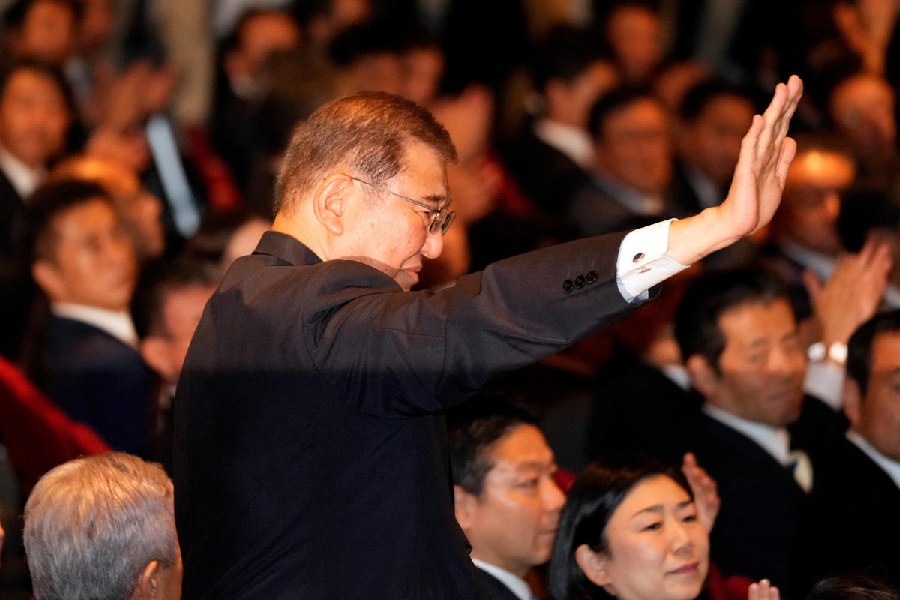
16Shigeru Ishiba acknowledges after he was elected as new head of Japan's ruling LDP party at the Liberal Democratic Party's (LDP) leadership election Friday, Sept. 27, 2024, in Tokyo. (Reuters)
The 67-year-old's successful leadership bid after four failed attempts puts the self-confessed lone wolf at the helm of a Liberal Democratic Party that has ruled Japan for most of the past seven decades.
Ishiba takes over with the party in crisis, having seen its public support ebb away over the past two years with revelations of links to a church branded a cult by critics and a scandal over unrecorded donations.
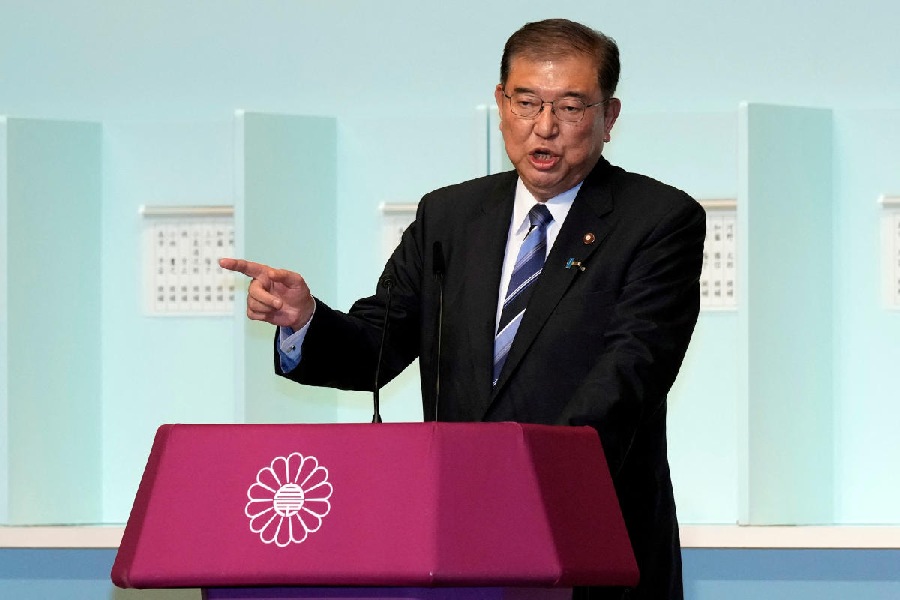
26Shigeru Ishiba speaks before a runoff election at the Liberal Democratic Party's (LDP) leadership election Friday, Sept. 27, 2024, in Tokyo. (Reuters)
A former defence minister who entered parliament in 1986 after a short banking career, Ishiba was sidelined by outgoing prime minister, Fumio Kishida, becoming instead a dissenting voice in the party.
He has rebelled on policies including the increased use of nuclear energy and has criticised his party for not allowing married couples to use separate surnames.
"I consider this my final battle," Ishiba said last month when he launched his campaign at a Shinto shrine in rural Tottori prefecture, where his father was governor and where Ishiba began his political career at the height of Japan's fast growing bubble economy.
"I will bring back a vibrant Japan where people can live with a smile."
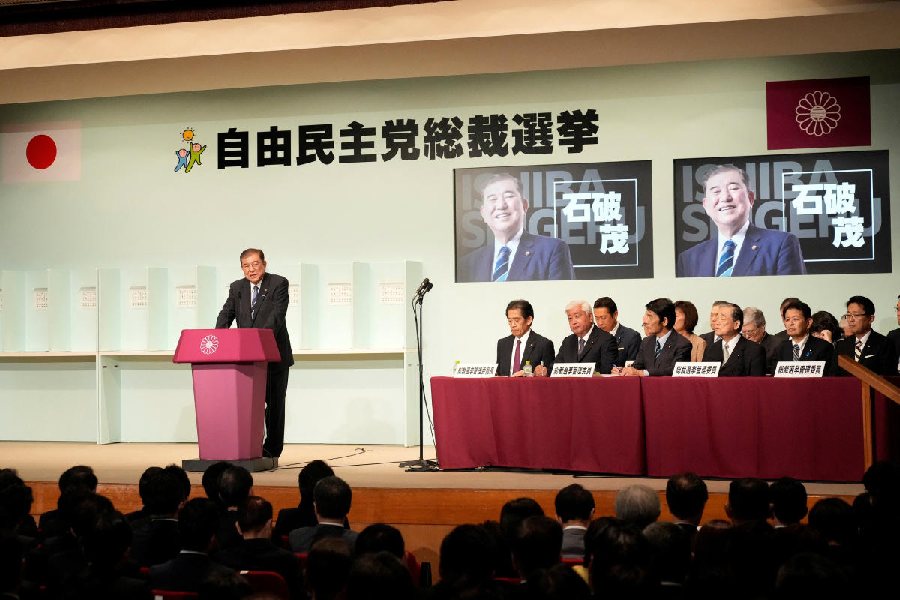
36Shigeru Ishiba speaks before a runoff election at the Liberal Democratic Party's (LDP) leadership election Friday, Sept. 27, 2024, in Tokyo. (Reuters)
Ishiba, who has also served as agriculture minister, promised to move some ministries and government agencies out of Tokyo to help revive Japan's moribund regions. He has also proposed establishing an agency to oversee the construction of emergency shelters across disaster-prone Japan.
Friction
But his outspoken views, including calls for Fumio and other prime ministers to step down, have earned him enemies in the LDP.
That enmity, which also stems from a four-year defection to an opposition group in 1993, made it difficult for Ishiba to win the 20 nominations he needed from fellow lawmakers to qualify as a candidate in the election on Friday.
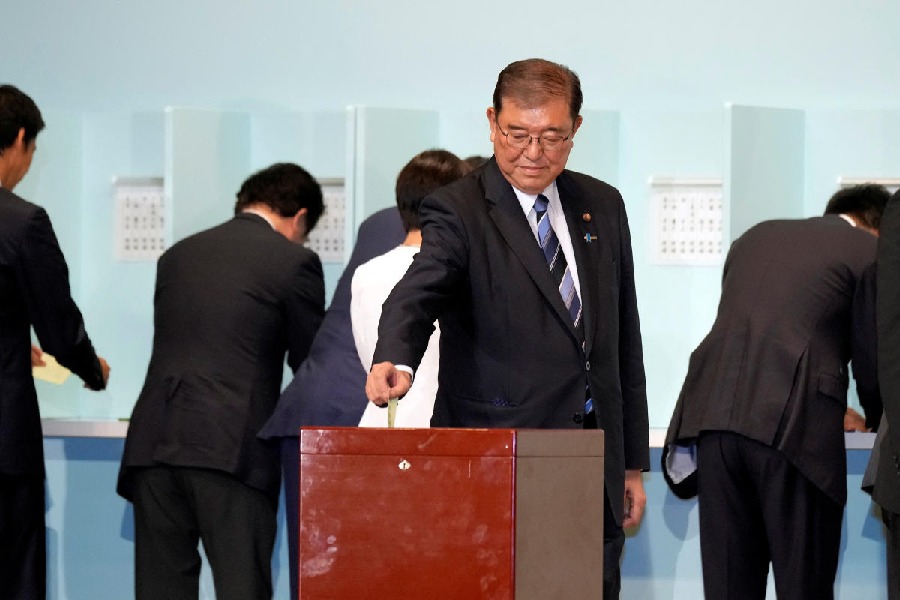
46One of candidates Shigeru Ishiba casts his ballot at the Liberal Democratic Party's (LDP) leadership election Friday, Sept. 27, 2024, in Tokyo. (Reuters)
After a first round of voting put him through to a run-off with economic security minster Sanae Takaichi, Ishiba acknowledged that his refusal to compromise has caused issues with his colleagues.
"I have undoubtedly hurt many people's feelings, caused unpleasant experiences, and made many suffer. I sincerely apologize for all of my shortcomings," he said in an address to LDP lawmakers who gathered at party headquarters for the election.
His lack of popularity among lawmakers means that Ishiba has had to rely on the support he has nurtured among rank-and-file members over his four decades in politics.
He has stayed in the public eye during his time away from government with media appearances, social media posts and on YouTube, where he muses on topics ranging from Japan's falling birthrate to ramen noodles.
He also pokes fun at himself, including his sometimes-awkward manner and hobbies including plastic models of ships and military aircraft, some of which he displays on the bookshelves that line his parliamentary office in Tokyo.
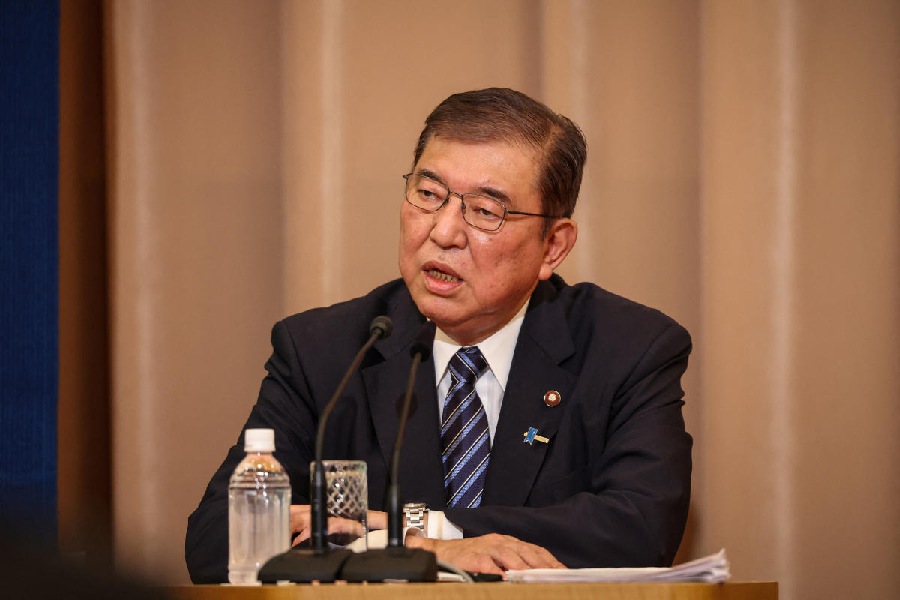
56Former defence minister Shigeru Ishiba, a candidate for Japan’s ruling Liberal Democratic Party’s (LDP) presidential election, speaks during a debate at the Nixon Kisha Club in Tokyo, Japan. September 14, 2024. (Reuters)
U.S. Diplomacy
Seen as an LDP intellectual heavyweight and expert on national security policy, he advocates for a more assertive Japan that can reduce its reliance on longtime ally, the U.S., for its defence.
That position, analysts say, could complicate relations with Washington.
During the LDP leadership campaign, he called for Japan to lead the creation of an "Asian NATO", an idea quickly rejected by Washington as too hasty.
In Okinawa where most of the U.S. troops in Japan are concentrated, he said he would seek greater oversight of the bases they use. He also wants Washington to give Japan a say in how it would use nuclear weapons in Asia.
In an interview with Reuters, Ishiba also criticized the U.S. political backlash to Nippon Steel's bid for U.S. Steel, saying it unfairly cast Japan as a national security risk. Kishida has avoided making comments on the issue ahead of the U.S. presidential election.
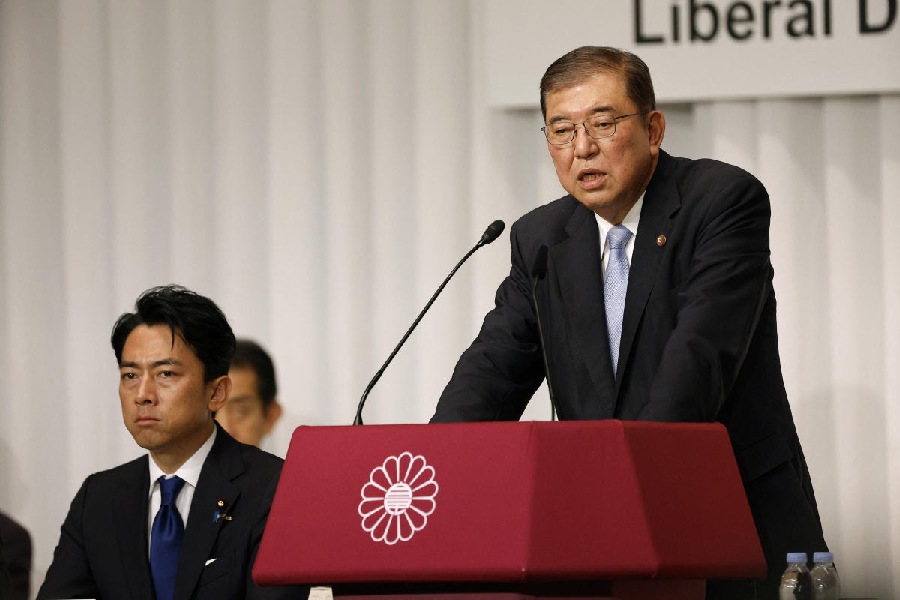
66Former Defense Minister Shigeru Ishiba, a candidate of Japan's ruling Liberal Democratic Party (LDP) presidential election, speaks during a joint press conference at the LDP headquarters in Tokyo, Japan, September 13, 2024. (Reuters)
Policy shifts
Ishiba has, however, softened some policy positions that have put him at odds with party colleagues, most notably saying he would keep some reactors operating in Japan, despite his past opposition to nuclear power and support for renewable energy sources.
A fiscal conservative who has promised to respect the independence of the Bank of Japan to set monetary policy, he has more recently said it is unclear whether conditions were right for a fresh hike in interest rates.
"Politicians don't need to be best friends, as long as their policies and political positions match," Ishiba said in a video posted on YouTube this week
What Japan’s Next Prime Minister Shigeru Ishiba Means for the World

September 27, 2024
Ishiba Shigeru is set to become Japan’s new Prime Minister after winning the presidency of the ruling Liberal Democratic Party (LDP) in a ballot of party lawmakers and members on Friday afternoon.
A plain-spoken populist and former defense minister who gained the LDP’s leadership on his fifth attempt—what he called his “final battle”—Ishiba, 67, emerged triumphant from a nine-strong field on promises to revitalize rural areas and win back public trust after a slew of scandals led to the stepping down of outgoing Prime Minister Fumio Kishida. Ishiba will assume the nation’s top job on Oct. 1 following a rubber-stamp parliamentary vote.
“Prime Minister Kishida has made a decision to let the LDP be reborn and win back the public's trust,” Ishiba said in his victory speech. “We must all pull together to respond to this.”
Ishiba’s leadership of the East Asian nation of 125 million has implications for global security given Japan’s increasingly prominent role alongside the U.S. checking China’s assertiveness in the Asia-Pacific. Under the outgoing Kishida, who announced he wouldn’t seek reelection last month amid plummeting popularity, Japan has beefed up defense spending and healed historical wounds with South Korea, another key regional U.S. ally.
A Tokyo native, Ishiba has both establishment and rebel credentials. He briefly worked in banking before embarking on his own political career following the death of his father, who was himself a lawmaker and cabinet member. He’s seen as distant from the right-wing faction of the party centered around the late Shinzo Abe, Japan’s longest-serving Prime Minister who was murdered in 2022, having reportedly turned down several cabinet posts under him.
That distance likely proved key in Ishiba’s victory. LDP elders recognized the need for change following public opprobrium regarding the Abe faction’s ties to the controversial Unification Church as well as the misuse of political funds. “Distrust grew in the Kishida administration because he didn’t really deal with the financial scandals of the LDP factions,” says Mieko Nakabayashi, a professor at Tokyo’s Waseda University and a former Japanese lawmaker.
Ishiba’s popularity was bolstered by his outspokenness on the need to properly investigate any malfeasance and for reforms to regain public confidence. Having previously served as agriculture minister and rural revitalization minister, Ishiba’s economic agenda focuses on revitalizing Japan’s outlying regions.
“He has the most credibility as somebody who understands the pain of the people,” says Jeff Kingston, director of Asian studies at Tokyo’s Temple University. “But he’s a blunt-spoken guy who doesn’t suffer fools easily, and many of his colleagues fit that bill. So he can seem arrogant and condescending to his fellow lawmakers.”
As a result, it’s perhaps unsurprising that Ishiba’s support lay more with LDP’s broad membership than fellow lawmakers, many of whom still regard him as a traitor for switching parties for several years in the 1990s. He was also the most populist of the main challengers and known for flip-flopping on various issues depending on public mood, including nuclear energy and whether a woman could serve as Emperor.
“There are many cases when he has changed his stance, so he is sometimes regarded as a weak leader who does not have really strong principles,” says Hosoya Yuichi, a professor of international politics at Keio University in Tokyo. “But at the same time, he is regarded as an experienced, reliable politician.”
Ishiba is one of only two of the leadership candidates who doesn’t speak English—remarkably, four of the nine were Harvard-educated—and is seen as a more conservative choice than his two closest challengers, who would have been either Japan’s youngest or first female leader. (The latter, Economic Security Minister Sanae Takaichi, was ahead on the first-round vote but was defeated by Ishiba in a runoff.)
Yet Ishiba also has a distinct maverick streak. He is one of the few LDP politicians to acknowledge Japanese mistakes in its 1910-45 colonization of Korea, which promises warmer ties with Seoul, though he has also openly called for the establishment of an Asian version of NATO, which may put him on collision course with Beijing.
Regarding U.S. ties, Ishiba has alarmed some by calling for a rebalancing of defense arrangements, with Japan taking more control and responsibility for its own security. He has a reputation as a security hardliner who is fond of building and painting models of aircraft and ships, which reportedly line his office walls, and he has previously voiced support for Japan developing its own nuclear deterrent. However, it’s unlikely he would deviate far from the U.S.-led orthodoxy. U.S. Ambassador Rahm Emanuel congratulated Ishiba in a post on X and said he looks forward to working with him to “cultivate even closer” U.S.-Japan ties.
“We will put our hearts into protecting Japan, local areas, rules, and the people of Japan,” Ishiba said Friday.
No comments:
Post a Comment